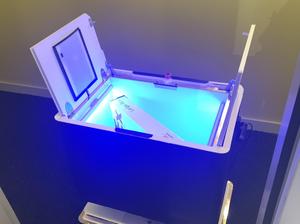
Shereen Shermak is a busy woman. Two years ago, she was multitasking as executive director of the Boston Women's Workforce Council, an entrepreneur-in-residence at Boston University and an angel investor. At BU, Shermak met a group of people who had developed a software that allowed different parties to use and compare encrypted datasets — without ever decrypting them.
Shermak and her team set out using the new technology to measure the women's wage gap in Boston. As they worked, they realized the software might have other applications, too, beyond the academic and nonprofit realms. Fintech, health tech and marketing tech were promising potential verticals, since they all use a multitude of datasets but require high degrees of privacy as well.
So in early 2020, Shermak and Andrei Lapets, founding director of BU's Software and Application Innovation Lab, co-founded a company based on the technology. Called Nth Party, the startup is in growth mode, looking to expand its customer base, funding and team after just a year in existence.
"What the technology actually does is for folks who want to contribute data to a common effort, whether that's a big organization like the Boston Women's Workforce Council taking average salary data across a large number of companies or two companies who want to do a marketing campaign together but aren't sure if they have the same customers on their lists to co-market to, it's helpful to share that data," Shermak said. "The other side can't see your data, but you can get the results, analysis of whether you have overlap."
To compare small datasets, Shermak says, each party would upload a CSV file to Nth Party's web app, nth.link. The data in the file would be encrypted right in the browser, so neither party could see the other's data. The software analyzes both datasets and returns results to the users.
Nth Party has raised about $160,000 from angel investors. In October, the startup was one of four companies accepted into a New York incubator called Betalab, which was formed through a partnership between startup studio Betaworks and James Murdoch’s Lupa Systems. Betalab's mission: “Fix the Internet.”
The startup's first client was in the health tech space, but now, Shermak says most inbound interest is coming from marketing firms. The team plans to spend 2021 expanding into that vertical, forming partnerships with martech companies that have large partner networks themselves to widen their reach. And yes, that could mean you receiving fewer marketing emails, Shermak says.
Later in 2021 and into 2022, Nth Party will focus on health care again.
"If you imagine, in health care, a hospital where you try to find trial patients for its drug or its vaccine, hospitals don't always want to exchange giant datasets. It would be easier and better for everyone if they could get the results only," Shermak said. "[They could see] which ones match the needs of the trial, and then they could decide on their own whether they want to reach out to those patients to send more information."






